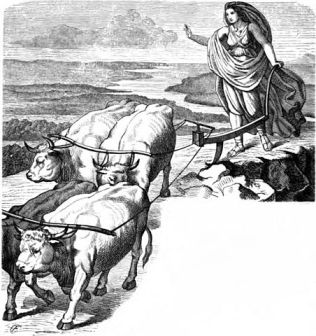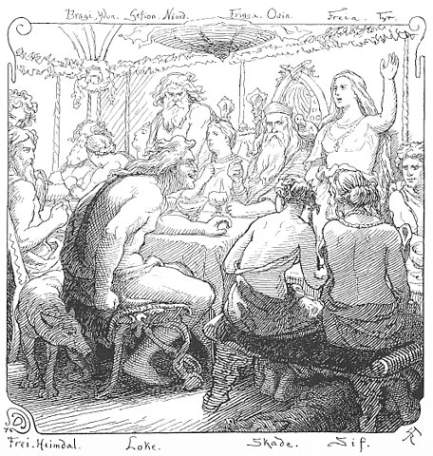Gefion is the goddess of agriculture, fertility, the unwed, virginity and virtue. She is one of the Vanir deities.
Short Facts
Tribe: Aesir
Goddess of: abundance, agriculture, chastity, fertility, ploughing, prophecy, prosperity, the unwed, virginity and virtue
Wife of: Skjoldr
Other names: Gefjun, Gefjon, Gefiun and Gefn
Gefion responsibilities
Abundance and prosperous lands, faithfulness, foreknowledge, foresight, growth, harvest, luck, magic, ploughing, protector of earth, virginity and wealth
Associated Animals with Gefion
Four sacred oxen that pull her plough
Gefion weapon/domain of power
Blooming lands, foresight, magic, her plough that cuts so deep it allows her to create new lands, shape-shifting
The goddess that gives
Gefion is the goddess of abundance, agriculture, fertility and virtue. She is one of Frigga’s handmaidens, and because of that, she is often mistaken for the goddess of the gods and subsequently with Freyja. Gefion however is a separate figure in the Norse pantheon, a goddess of the earth and an exceptional force of the Aesir.

Her name means giver or generous one and she is one of the most powerful Norse goddesses. She is a skilled shapeshifter, assuming either the appearance of an old and homeless woman or on some occasions of a white crow. Gefion protects the earth and oversees all that grows in the land. Green and gold are her colours, and her great plough is her symbol. She is followed and served by women who died as virgins.
Despite the fact that little is known about her, Gefion is a prominent goddess with a clear influence. Her father and mother are unknown, and so to her siblings – if there are any. The only information about her relations with other deities or beings is that she has four sons with a nameless Jotunn, although that seems to contradict the description of her being a maiden.
Creator of lands
The most well-known story about Gefion is the myth that she creates the island of Zealand. In Gylfaginning, King Gylfi, ruler of a terrain known now as Sweden, was impressed by an unknown, poor and homeless, woman. He tries to woe her, but fails and then offers her as much land as she could plough in one day and one night.
As it came to light afterwards, that woman was Gefion, who having used her shape-shifting magic to turn her sons into four great oxens, began at once to plough the soil. But, her plough was a divine instrument that cut so hard and deep it uprooted the land, and the massive oxen drew it out into the sea and placed it on the water. From the hole left behind, a lake appeared (lake Vanern), and the land taken to the sea became an island. And that is how the island of Zealand was created.
This ritual of claiming the land was common in the old days. Scholars mention that it showed the capabilities of a person who wanted a piece of land. By many accounts, Zealand is said to be the most productive area of Denmark. Yet, Gefion was a deity and even though the line between fiction and reality tends to get a little thin from time to time, this story shows how truly potent and captivating the narrative of the Eddas and sagas was and still is.
Mentions
In the Poetic Edda, in the poem Lokasenna, while on a feast held in Aegir’s hall, Gefion wonders why there should be the bad talk among the gods, and accuses Loki of causing this unrest and also that he is a foul mocker. Loki replies by implying that Gefion is a cheap and immoral woman, having slept with a boy who has given her a necklace. Odin cuts in then, calling Loki mad to provoke Gefion’s wrath, for she sees everyone’s fate just as Odin himself.

In Gylfaginning, the story of Gefion and the creation of the island of Zealand is given in full. Later on, in the same book, Gefion is mentioned as the fourth goddess of the Aesir and that she is a virgin.
In the Skaldskaparmal, Gefion appears at one of Aegir’s feasts on the island of Hlesey.
In the Ynglinga saga, the tale of the plough that gives birth to Zealand is told again. Moreover, Gefion is said to marry one of the first legendary kings of the Danes, named Skjoldr.
In the poem Ragnarsdrapa by Bragi Boddason, Gefion’s ploughing tale is brought up once more.
Play Fun Norse Quiz
Is this article making you even more curious about Norse gods and goddesses? You can satisfy your curiosity by playing a fun Norse mythology quiz. This way, you can test your knowledge about Norse gods and goddesses, as well as fill in some gaps. Good luck and have fun playing!
Frequently Asked Questions
Q. Who is really Gefion?
A. ‘‘She may not be famous like Frigga or Thor, but Gefion is a major Aesir deity. Yes, there is little information about her, but it’s easy to figure out that she is a great goddess; one that even Odin Allfather worries about waking her wrath as he warns Loki about it. So, there is no doubt that Gefion is an essential figure in the Norse pantheon’’
Q. Is Gefion sister to Frigga?
A. ‘‘Gefion is Frigga’s consort. Apart from that, there is nothing else in the old texts that might suggest a relation of that kind. Gefion’s origins seem to be lost in time with not so much as a hint as to who her father or mother was, or if she had any brothers and sisters at all. Gefion had four sons with an unknown Jotunn. That is all there is about Gefion’s family’
Q. How come Gefion has four sons when it is said that she is a virgin?
A. ‘‘Now, that is a mystery, isn’t it? Gefion is the goddess of virginity and she is a virgin deity herself. At the same time though, she has four sons, whom she turns into oxen to plough the land of Sweden. How is that possible? Well, the goddesses were virgins based on their marital status (that is if they were unmarried) and not on their sexual activities. Therefore, by these standards, Gefion is truly a virgin’’
